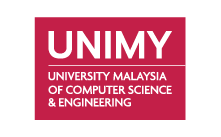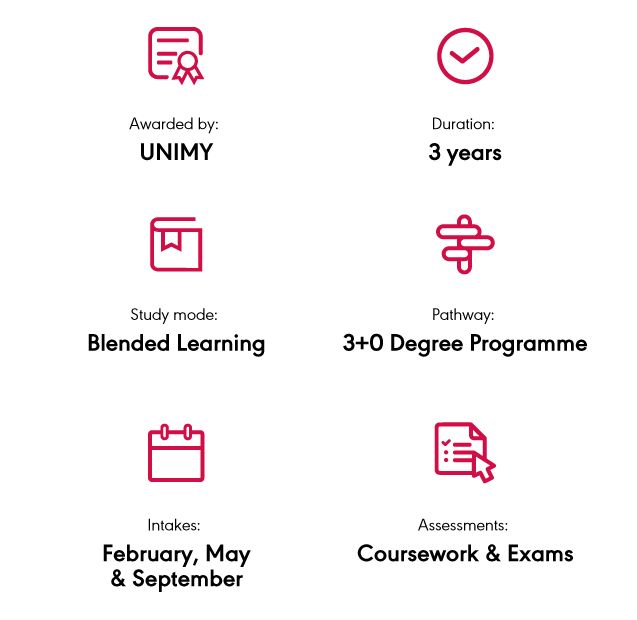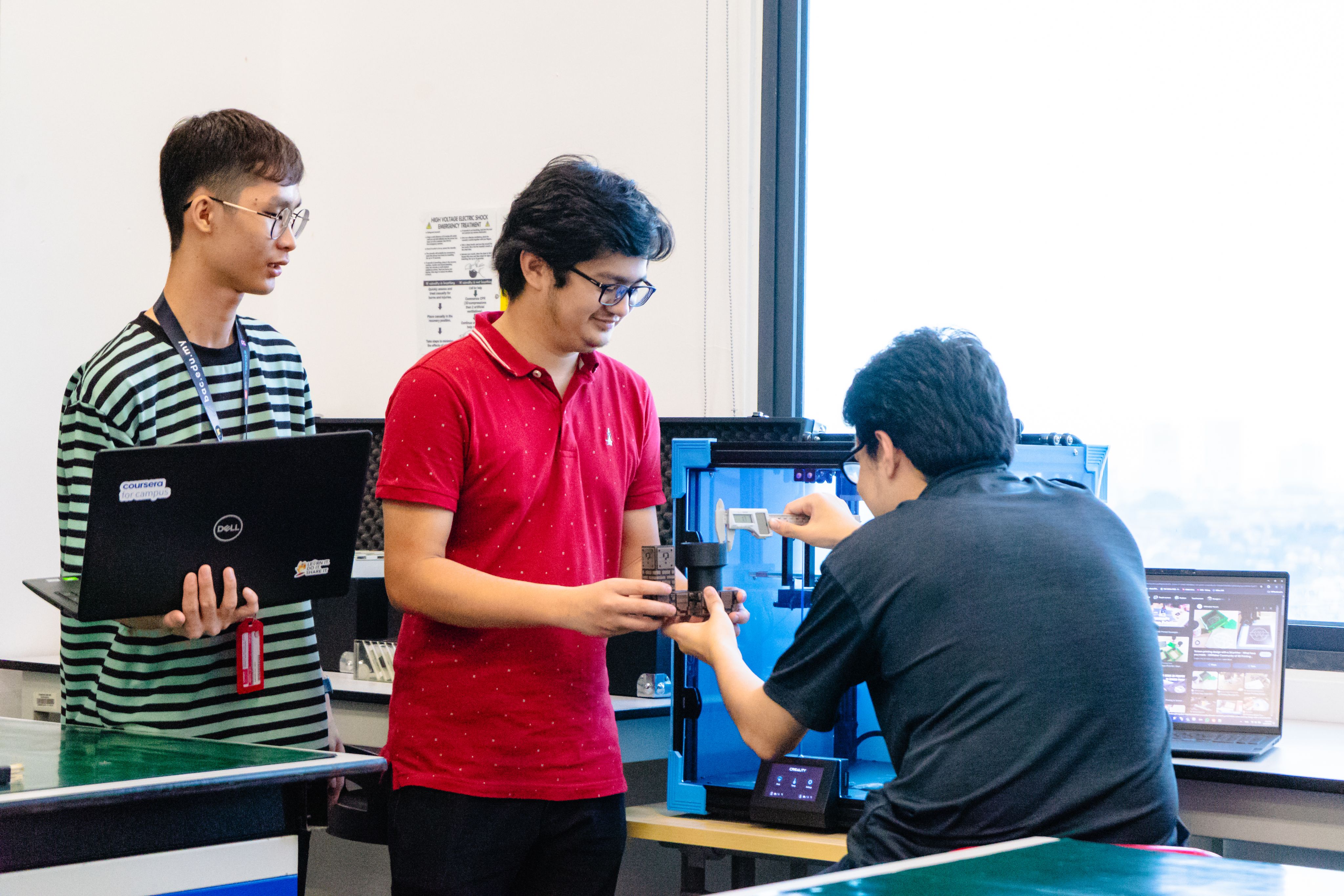Bachelor of Computer
Science (Hons)
University Malaysia of Computer
Science & Engineering (UNIMY)

Here’s the Course Overview
Are you passionate about technology and driven to innovate? UNIMY's Bachelor of Computer Science (Hons) empowers you to become a leader in the field. This degree blends rigorous theoretical foundations with practical, hands-on experience, equipping you with advanced programming skills and the ability to create and enhance cutting-edge software applications. With the ever-evolving nature of computer science, our flexible curriculum allows you to explore your interests and specialise in areas that ignite your passion.
You’ll sharpen your problem-solving abilities while mastering algorithms, data structures, and software development. Through hands-on projects, you’ll build real-world applications and drive technological progress.
With strong industry ties, you’ll gain valuable experience through internships, industry collaborations, and networking opportunities. Guided by experienced faculty and a future-focused curriculum, this programme ensures you graduate ready to lead in the digital era.
Course Entry Requirements
- A pass in Matriculation or Foundation with minimum of CGPA 2.00, and a credit in Additional Mathematics or Mathematics and any Science, Technology or Engineering subject at SPM/IGCSE level or any equivalent qualification.
- A pass in A Level with at least Grade D in any 2 subjects; and a credit in Additional Mathematics or Mathematics and any Science, Technology or Engineering subject at SPM/IGCSE level or any equivalent qualification.
- STPM with a minimum grade C (GP 2.00) in any 2 subjects, and a credit in Additional Mathematics or Mathematics and any Science, Technology or Engineering subject at SPM/IGCSE level or any equivalent qualification.
- STPM (Science Stream) with a minimum grade C (GP 2.00) in ONE Mathematics subject and ONE Science/ICT subject.
- A related Diploma with a minimum CGPA of 2.50; or
- UEC - 5 grade B passes in UEC (Senior Middle Three) in any subjects, including Advanced Mathematics; or Grade B in Mathematics and any Science or Technology or Engineering subject.
- Other equivalent qualification recognised by the Malaysian Government.
* If you do not have a Grade C in Mathematics, you will need to enrol in and successfully complete a pre-requisite module, Mathematics I, during your first semester of the degree.
Why choose UNIMY?
- Comprehensive Curriculum: Explore a wide range of computer science disciplines.
- Industry-Ready Skills: Gain the theoretical and practical knowledge employers demand.
- Hands-on Learning: Develop your skills through practical training, workshops, and real-world projects.
- Industry Connections: Benefit from strong partnerships for internships, industry visits, and networking.
- Expert Faculty: Learn from highly experienced and qualified instructors.
- Diverse Career Paths: Open doors to a wide range of exciting career opportunities.
- Future-Focused Education: Prepare for the latest technologies and trends shaping the future of computing.

COURSE MODULES
Year 1
- Programming Techniques
- Database Systems
- System Development
- Data Communication & Networks
- Mathematics I
- Object Oriented Programming
- Operating Systems
- Software Engineering
- Third Language
- Mathematics II
Year 2
- Data Structure and Algorithms
- Probability & Statistics
- Computer Science Theory
- Algorithm Design & Analysis
- Programming Paradigm
- Human Computer Interaction
- Research & Innovative Thinking
- Industrial Workshop
- Compiler & Program Analysis
- Principles & Applications of Parallel Programming
Year 3
- Information Assurance & Security
- Software Project Management
- Professional Communication
- Artificial Intelligence
- Programming Language Design & Semantic
- Final Year Project I & II
- Distributed Application Development
- Industrial Training
Electives
- Ethical Hacking
- Network Defense
- Networking Systems & Technology
- Information Technology Management
MPU Modules
- New Venture Creation
- Appreciation of Ethics and Civilisation (Malaysian Students)
- Malay Communication 2 (International Students)
- Integrity and Anti-Corruption
- Philosophy & Current Issues
- Community Service
- National Language A
TUITION FEES
|
MALAYSIAN STUDENTS |
||
|---|---|---|
|
Year 1 |
Year 2 |
Year 3 |
|
Resource Fee: RM1,000 per year |
||
|
INTERNATIONAL STUDENTS |
||
|
Year 1 |
Year 2 |
Year 3 |
|
Resource Fee: RM1,000 per year |
||
You Might Also Like These Courses
Bachelor of Software Engineering with Honours
You will become proficient in programming languages such as Java, Python, C++, and JavaScript, empowering you to create robust and scalable software solutions. Through coursework and hands-on projects, you will also master system design, web development, and database management, preparing you to build dynamic web applications and handle data effectively.
Bachelor of Computer Engineering with Honours
With accreditation from the Engineering Accreditation Council and recognition by the Board of Engineers Malaysia, you will graduate as a certified Graduate Engineer, with the pathway to achieve the prestigious title of Ingenieur (Ir.) as a Professional Engineer.
Bachelor of Computer Science (Data Science) with Honours
In this course, you’ll master the cutting-edge tools and techniques that fuel the modern world, from machine learning to predictive analytics. With our forward-thinking, industry-ready curriculum, you won’t just keep pace with technological evolution - you’ll lead it.







